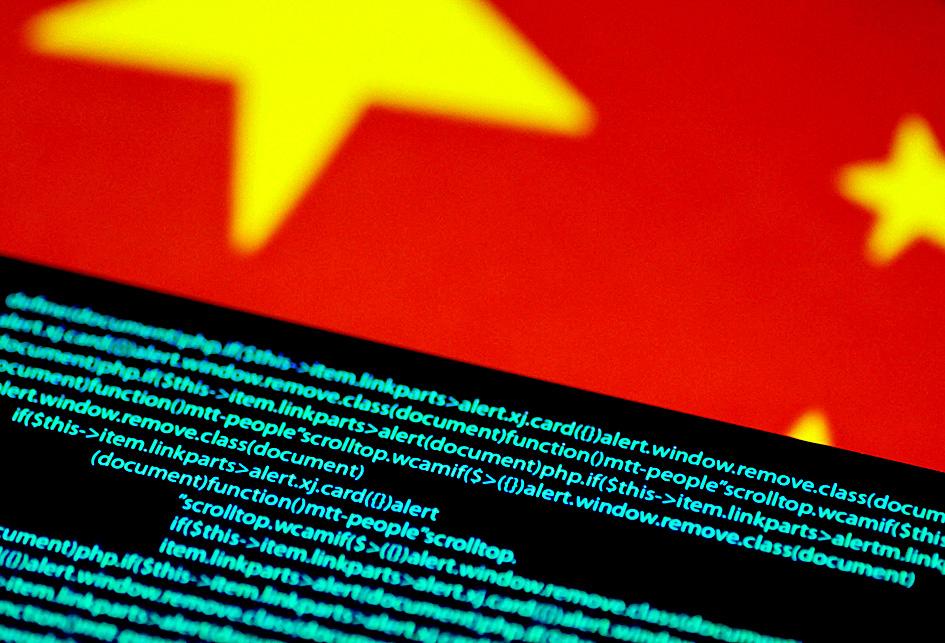China is conducting disinformation campaigns that involve more than 400 fake accounts targeting Taiwanese on social media, the Investigation Bureau said on Friday.
China is trying to infiltrate social media, Internet forums and online chatrooms that are popular among Taiwanese to subvert the public’s trust in the government, destabilize society and meddle in elections, the bureau said.
Since it started tracing fake accounts and disinformation to Chinese content farms in April last year, the Information and Communication Security Division investigated 2,773 such cases, the bureau said.

Photo: REUTERS
It has forwarded 174 cases to prosecutors, who have listed 234 people as suspects, the bureau added.
An official involved in the investigations said that China had planted 20 accounts on CK101.com (卡提諾論壇), a popular forum among Taiwanese, using mobile phone numbers registered outside Taiwan and e-mail addresses with foreign providers.
“These accounts are specializing in posting fake news and disinformation to undermine the COVID-19 measures implemented by Taiwan’s health authorities, create confusion and circulate politically charged messages to generate disputes and conflicts,” said the official, who declined to be named. “These are clearly products of China’s content farms.”
The bureau also uncovered that Chinese accounts had altered posts on the People’s Technology Temple (PTT) — Taiwan’s most popular online bulletin board system.
Such posts were additionally disseminated through Facebook and Chinese microblogging sites, the official said.
“This is the first level of their cyberattack operation,” they said.
The second level of the content farms’ operations involves targeting Taiwanese Facebook users with 400 fake accounts, the official said.
Those accounts target Taiwanese by reposting fake news and disinformation, focusing on topics such as entertainment, daily issues and religion, they said.
The third level of their operations involves convincing Taiwanese to repost the content or share it with friends and family, the official said, adding that such fake news might spread to “every corner of society.”
The official said that fake news tailored to Taiwanese social media users is part of a coordinated campaign.
“Through cognitive warfare, the Chinese cyberarmy is attempting to stir conflict and hatred between social groups, undermining Taiwan’s national security,” the official said.
The bureau said that a dedicated task force would be launched to counter Chinese cyberwarfare ahead of local elections in November.
Social media users should be aware of the danger of fake news and disinformation, the bureau said, urging people to try to verify content they access online, especially before sharing it, as they might contravene the law by spreading fake news without due diligence.
Additional reporting by Jason Pan

TRUST: The KMT said it respected the US’ timing and considerations, and hoped it would continue to honor its commitments to helping Taiwan bolster its defenses and deterrence US President Donald Trump is delaying a multibillion-dollar arms sale to Taiwan to ensure his visit to Beijing is successful, a New York Times report said. The weapons sales package has stalled in the US Department of State, the report said, citing US officials it did not identify. The White House has told agencies not to push forward ahead of Trump’s meeting with Chinese President Xi Jinping (習近平), it said. The two last month held a phone call to discuss trade and geopolitical flashpoints ahead of the summit. Xi raised the Taiwan issue and urged the US to handle arms sales to

A magnitude 5.6 earthquake struck off the coast of Yilan County at 12:37pm today, with clear shaking felt across much of northern Taiwan. There were no immediate reports of damage. The epicenter of the quake was 16.9km east-southeast of Yilan County Hall offshore at a depth of 66.8km, Central Weather Administration (CWA) data showed. The maximum intensity registered at a 4 in Yilan County’s Nanao Township (南澳) on Taiwan’s seven-tier scale. Other parts of Yilan, as well as certain areas of Hualien County, Taipei, New Taipei City, Taoyuan, Hsinchu County, Taichung and Miaoli County, recorded intensities of 3. Residents of Yilan County and Taipei received

Taiwan has secured another breakthrough in fruit exports, with jujubes, dragon fruit and lychees approved for shipment to the EU, the Ministry of Agriculture said yesterday. The Animal and Plant Health Inspection Agency on Thursday received formal notification of the approval from the EU, the ministry said, adding that the decision was expected to expand Taiwanese fruit producers’ access to high-end European markets. Taiwan exported 126 tonnes of lychees last year, valued at US$1.48 million, with Japan accounting for 102 tonnes. Other export destinations included New Zealand, Hong Kong, the US and Australia, ministry data showed. Jujube exports totaled 103 tonnes, valued at

BIG SPENDERS: Foreign investors bought the most Taiwan equities since 2005, signaling confidence that an AI boom would continue to benefit chipmakers Taiwan Semiconductor Manufacturing Co’s (TSMC, 台積電) market capitalization swelled to US$2 trillion for the first time following a 4.25 percent rally in its American depositary receipts (ADR) overnight, putting the world’s biggest contract chipmaker sixth on the list of the world’s biggest companies by market capitalization, just behind Amazon.com Inc. The site CompaniesMarketcap.com ranked TSMC ahead of Saudi Aramco and Meta Platforms Inc. The Taiwanese company’s ADRs on Tuesday surged to US$385.75 on the New York Stock Exchange, as strong demand for artificial intelligence (AI) applications led to chip supply constraints and boost revenue growth to record-breaking levels. Each TSMC ADR represents